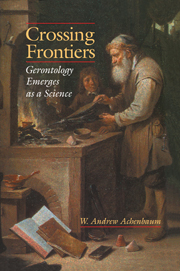Conclusion
Published online by Cambridge University Press: 26 March 2010
Summary
The current state of the field
There never was a golden age in gerontology's past. “Gerontologists who have lived long enough to represent their subject matter will recall the days when our field was all but invisible within the panoply of established scientific disciplines,” recollects Robert Kastenbaum. “We often described ourselves as a—with a special interest in aging and the aged. (This blank would be filled variously by ‘psychologist,’ ‘biologist,’ ‘economist,’ etc.).” Still, many U.S. researchers in the early 1960s expressed high hopes for the field's future. Clark Tibbitts pointed out that “half our scientific knowledge has been gained since 1950.” Investigators were excited by the opportunities for combining basic and applied research on aging. As Leonard Cain put it, “This new and burgeoning field represents a peculiar amalgam of scientific research and reformist commitment with the attributes of a major social movement.” By the end of the decade, other prominent gerontologists spoke more guardedly. “In spite of the enormous increase in research output and in spite of our pride in the advancement of knowledge, superficially seen as the result of this increase,” declared two Gerontological Society (GSA) presidents, Carl Eisdorfer and Powell Lawton, “our concepts of research and theory have not advanced beyond viewpoints of the nineteenth century.”
Gerontology did not become a Big Science, but it grew more scientistic. “After a while,” continues Kastenbaum, “there were enough of us blankety-blanks to persuade at least each other that we now had something resembling a coherent field of research, service, and education.”
- Type
- Chapter
- Information
- Crossing FrontiersGerontology Emerges as a Science, pp. 251 - 268Publisher: Cambridge University PressPrint publication year: 1995



